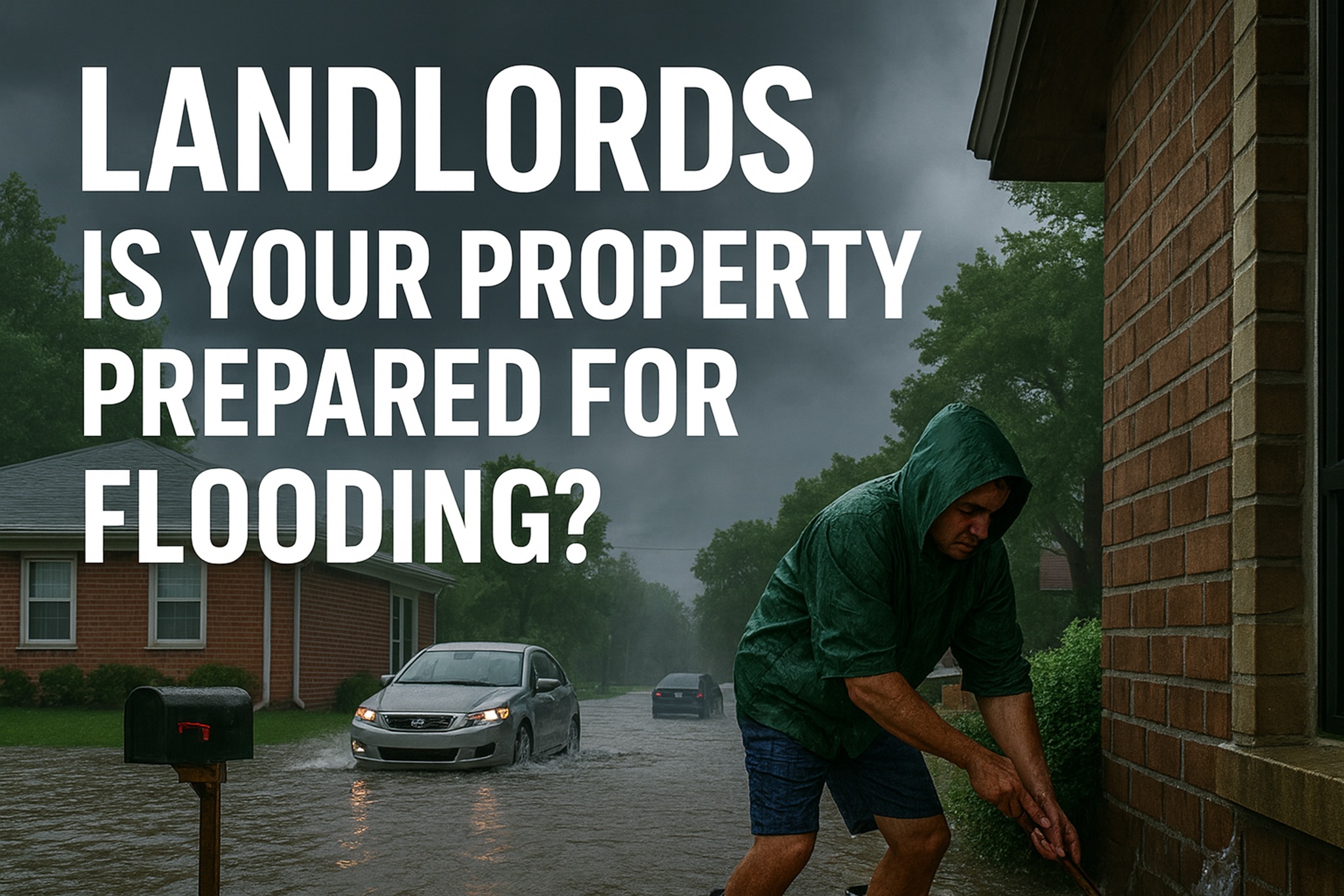
Author: Mark Ainely | Partner GC Realty & Development & Co-Host Straight Up Chicago Investor Podcast
Let me guess, you thought the worst was behind us after Friday’s downpour?
In a matter of days, we’ve seen flash floods rip through the city’s South Side, flood basements in Bridgeview and Summit, shut down roads in Elmhurst, and leave landlords mopping up messes that insurance adjusters haven’t even gotten to yet.
Now here’s the thing: flooding isn’t new in Chicago. It’s part of the deal when you invest here. But if the last 72 hours didn’t wake you up to how fragile your rental portfolio can be, then I don’t know what will.
This wasn’t just a weather event. It was a stress test on your systems. It tested how prepared you are. It tested whether your sump pump is functional, whether your tenant knows what to do when the water starts rising, and whether you’ve structured your property management to be reactionary or resilient.
Here’s the truth: if your basement took on water, that’s on the rain.
If it stayed wet for days and turned into a mold trap, that’s on you.
If you want to discuss your specific scenario with me that you are going through, schedule a call today.
When Rain Turns to Ruin
Let’s break it down.
Friday afternoon, the skies opened over the Southwest Side.
Bridgeview took on more than six inches of rain in two hours. That’s not an exaggeration. That’s measured.
Summit saw waist-deep water destroy a newly finished basement—washer and dryer gone before they ever paid for themselves.
West Lawn dealt with sewer backup that had families using towels and mops to bail out human waste.
Darien’s police department—a government facility—flooded. The evidence room took damage. Booking areas were soaked. Power went out.
Then came Sunday, and just when you thought the weather had moved on, it hit Elmhurst with flash flooding that submerged Robert T. Palmer Drive and turned parking lots into lakes. Residential streets were washed over in minutes.
From Elgin to Oak Lawn to Ashburn, from North Avenue to Harlem and 47th to 76th—basements filled, power failed, and all across Chicagoland, landlords and tenants were suddenly face to face with water—and not the kind you pay for.
The Landlord Reality Check
These last few storms exposed two types of landlords:
The ones who waited for a tenant to tell them something was wrong.
The ones who already had a system in place and were one step ahead.
If you’re in the first group, this isn’t to shame you. It’s to wake you up.
Because storms like this one aren’t the exception anymore. They’re the norm.
What You Should Be Doing (If You’re Not Already)
Inspect Your Properties. In Person.
Don’t rely on tenant updates alone. After any storm, get out there. Especially in neighborhoods that are lower elevation, near viaducts, or have combined sewer systems. You know where your trouble spots are—don’t wait until a mold claim tells you you should’ve checked.
Don’t Treat Sump Pumps Like a Bonus Feature
They're not a luxury. They’re your first line of defense. Check that they work. Make sure there's a battery backup. Test them before every heavy rain season. One landlord I know skips this step every year and ends up paying $3,000–$5,000 in restoration fees by September. That’s not unlucky. That’s a pattern.
Invest In A Backflow Preventer
This might seem like a large investment of a few thousand dollars but will bring peace of mind for you, your tenants, and your home.
Set Tenant Expectations Before the Water Hits
Most tenants don’t know the difference between seepage and a sewer backup. They don’t know not to walk through standing water. They don’t know that mold can form within four days. Give them a one-page PDF or text message with simple directions:
What to do first
What not to touch
Who to call
When to call you
Do that once and it pays for itself the first time your basement floods at 3 AM and your tenant knows what not to do.
Upgrade Where It Matters
You’ll spend hours comparing quartz countertops, but you’re ignoring the $220 sump pump you bought in 2015. Get the better pump. Put in the check valve. Add the battery backup. You won’t be thinking about how that $500 investment affected your ROI when you're looking at soaked drywall and a destroyed HVAC.
Many investors hire us to handle this all including sump pump replacement, backflow preventer installs, and making sure the tenant is happy. See how little it costs you monthly to reduce your risk when it comes to these floods.
What the Floods Looked Like (And Where They Hit)
Bridgeview: 6+ inches of rain in two hours. Major street flooding. Submerged cars.
Summit: Basement flooded waist-high. New appliances lost.
West Lawn: Sewer backups, soaked basements, sewage overflow.
Garfield Ridge: Widespread basement flooding. Over 200+ flood reports. Multi-family homes hit hard.
Darien: Police station flooded, including evidence and booking rooms. Power outages reported.
Ashburn: Water overflow near Daley College. Blocked sewers. Basement water intrusion in multiple homes.
Chicago Ridge: Street and yard flooding. Water entered ground-level units.
Westchester: Flash flooding and overwhelmed sewers. Residents reported basement damage and sump pump failures.
Elmhurst: Underpasses shut down. Streets turned to lakes. Residents cleaning debris.
Oak Lawn & Elgin: Localized flooding. Storm drains overwhelmed. Street closures and cleanup efforts underway.
This wasn’t localized. This wasn’t random. This was the kind of citywide weather punch that leaves behind insurance claims, vacancy loss, and frustrated tenants.
How It’s Costing You (Even If You Don’t Know It Yet)
Let’s say you get lucky and the damage looks minor. You don’t see visible mold yet. You think the basement’s drying on its own.
Now fast forward 90 days:
Tenant complains about a musty smell.
You pull up carpet and find black mold on the subfloor.
HVAC pulls spores into the vents.
Mold claim hits your insurance.
Tenant wants to break the lease.
You’ve got to gut the basement.
All because you didn’t act fast when you could’ve.
Now let’s take the same scenario but imagine you’d hired a property manager or even just had someone inspect the place 24 hours after the rain. Problem identified, remediated, tenant happy, property intact.
Not sure if your rent rate even covers hiring help like that? You can find out in less than a minute using our Property Management Quote Estimator. No pressure. No call. Just real-time data to see if you can afford to protect your investment—and your sanity.
Think Long Term. React Short Term.
The point isn’t to overreact every time the sky turns gray. It’s to build systems that let you sleep when it does.
Flooding is part of owning property in Chicago. But losing thousands of dollars to it doesn’t have to be.
So before the next round hits (and trust me, it’s coming), ask yourself:
Do I have the right preventative systems in place?
Does my tenant know what to do if water enters?
Is my property manager proactive or reactive?
Can I afford to spend another weekend ankle-deep in my tenant’s basement?
Because being a landlord isn’t just about collecting rent. It’s about managing risk.
And in Chicago, one of the biggest risks is pouring from the sky.
There is a lot of information contained here if you plan on investing in real estate locally. It may seem overwhelming for those wanting to invest in the Chicago market, but it is really just a team sport. Who is on your investing team? Do you even have a team? GC Realty & Development, LLC. has a dedicated team of professionals that are willing to share their decades of experience in all facets of real estate. We handle everything from Brokerage, Leasing and Property Management. Whether you hire us or not, we are happy to provide you with our resources and expertise.
What gets me up in the morning and keeps me going twelve hours a day is the ability to add value to local area investors, in Chicago and beyond! Those who connect with me often hear me say that our goal is to bring value to everyone we come in contact with. We hope that in return, they will one day hire us for our Tenant Placement,or Property Management Services, refer us to someone they know, or leave us a review about our services. We would clearly love all three, however, we are happy whenever we get the opportunity to help!
Reach out today!

Partner / Co Host of Straight Up Chicago Investor Podcast

 Vendor Portal
Vendor Portal



